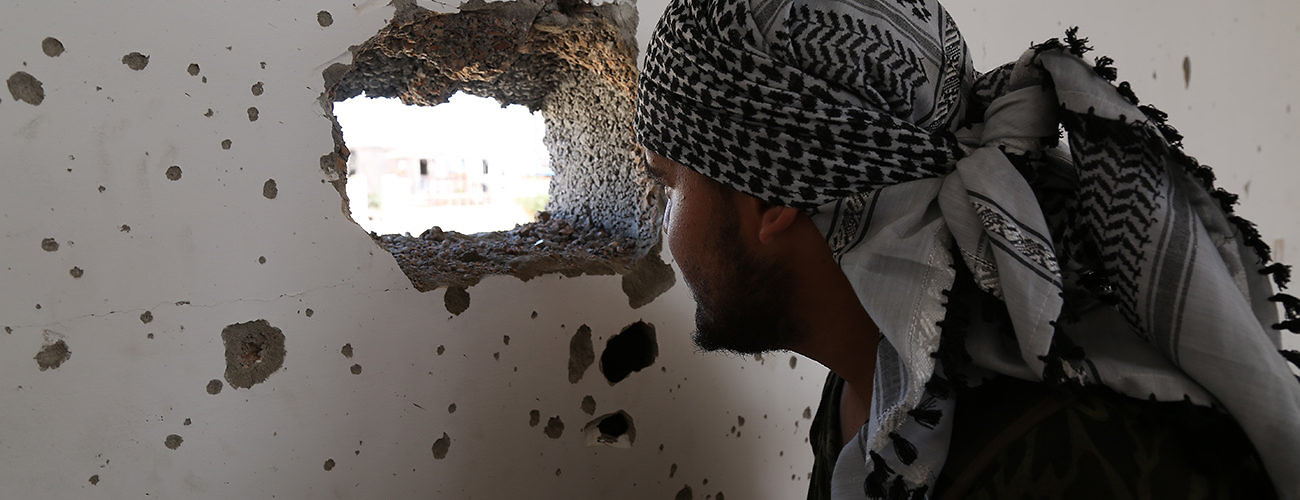A Libyan figher monitors the Central Bank facility controlled by ISIS. Sirte, Libya, September 3, 2016. (Mohamed Lagha/Associated Press)
The looming defeat of the Islamic State in Sirte is being hailed as a major success in reducing the group’s Libyan presence. However, we should be under no illusions: Liberating Sirte will neither completely rid Libya of ISIS nor put an end to the group’s ambitions in North Africa. Militants fleeing Sirte will undoubtedly disperse, not just within Libya but to other nearby countries. Tunisia is particularly at risk among these.
Tunisians form one of the biggest contingents of ISIS foreign fighters in Libya, at an estimated 1,000-1,500 individuals. Some of the major attacks in Libya have been carried out by Tunisian militants, including those on the Corinthia Hotel in Tripoli and on Tripoli’s airport in 2015. Tunisian nationals have not only served as suicide bombers, they have also occupied leadership positions, including at the helm of ISIS in Sirte itself.
The markedly Tunisian character of ISIS in Libya has already directly affected Tunisia’s security. Some of the worst attacks perpetrated in the country in 2015 and 2016 have been linked back to individuals who have either trained in Libya or launched attacks from Libyan territory. The assailants involved in both the Bardo Museum attack on March 18, 2015, which killed 20 people, and the beach resort attack in Sousse on June 26 this year, which left 39 dead, are thought to have trained in Sabratha, a town in northwestern Libya near the Tunisian border.
An ISIS cell located near Sabratha is believed to be dedicated to launching attacks in Tunisia. Members of this cell attacked Tunisian army and police posts in the border town of Ben Guerdane on March 7 this year, killing some 50 people. The cell seems to be composed almost entirely of Tunisian nationals, who are thought to have coordinated the March violence with sleeper cells in Ben Guerdane.
That assault was quashed by Tunisia’s security forces. Yet it did raise questions about the intentions of ISIS toward Tunisia in the longer term. It also demonstrated that the group’s Libyan arm can already rely on sleeper cells in Tunisia to assist in carrying out attacks across the border. The return of Tunisian militants from Libya could enhance this capacity. A few spectacular attacks could help to boost the group’s image following the setback in Sirte.
The potential domestic repercussions of an ISIS defeat in Sirte would add fuel to Tunisia’s already growing problem with violent extremism. Tunisian security forces are fighting a low-level insurgency in the Mount Chaambi region near the Algerian border, waged by Uqba ibn Nafi, an al-Qaeda in the Islamic Maghreb affiliate. Tunisia’s largest Salafist group, Ansar al-Sharia Tunisia, which initially refrained from calling for domestic jihad, now embraces it as a result of a crackdown by authorities that saw the group’s fragmentation. Some of its members could be susceptible to joining ISIS cells or the affiliated Jund al-Khalifa group. Tunisian foreign fighters from Syria and Iraq, many of whom had joined the ranks of ISIS, have also begun to return. Blowback from the Libyan theater would only make matters worse.
Despite the steady growth of violent extremism in Tunisia, authorities have been slow to put together a counterterrorism strategy. Lack of inter-agency coordination and inadequate cooperation between security forces and the civilian leadership has also hampered the emergence of a coherent and coordinated response. Measures to curtail the flow of foreign fighters have been slow to arrive and the authorities are still grappling with how to deal with returnees.
Following the 2015 attacks, Tunisian authorities constructed a 125-mile barrier along part of the border with Libya. The United States and Germany have been assisting in installing an electronic monitoring system to help secure this barrier. The US has provided additional military equipment to help in monitoring activities. US Special Operations Forces are also assisting Tunisian troops in carrying out counterterrorism operations inside their borders. Furthermore, mentoring and training of security forces responsible for securing the Libyan border are being undertaken by a small contingent of United Kingdom troops. These measures may be helpful, but they are unlikely to be sufficient.
Part of the difficulty in securing the border is that there is no effective partner on the Libyan side. Before the country descended into civil war in mid-2014, Libya had signed an agreement on security cooperation with Tunisia, which envisaged joint border patrols, the reestablishment of security checkpoints and exchange of information. Before any such agreement can be worked out in the current context and, more importantly, implemented, the Libyan government would need to reestablish authority in the border region and consolidate security institutions there. This is unlikely to happen in the short term.
The absence of a functional Libyan government is compounded by a lack of adequate regional activity to contain the spread of ISIS in North Africa. Tunisia and Algeria’s intensified cooperation on border security and counterterrorism is a positive step on the bilateral front, but a regional response is ultimately needed to tackle a regional problem.
Tunisia will need sustained international assistance to cope with the fallout from the degrading of ISIS in Libya. It could otherwise easily fall prey to further terrorist attacks and counterproductive knee-jerk political reactions toward them. International partners should focus not only on training and equipping, but also on improving security sector governance and regional cooperation in the areas of border security and countering violent extremism.
Lisa Watanabe is Senior Researcher at the Center for Security Studies at ETH Zurich.





